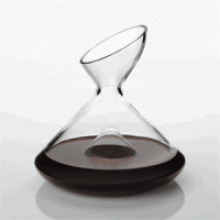My mother has three decanters that I know of. One is part of a sherry set, and my parents did sometimes use the set to serve sherry and port, and on at least one occasion the port truly did need to be decanted. The other two are wine decanters, and I don't remember ever seeing them used. One of them my mother bought and used fairly frequently when she was living in Germany, and drinking German and Italian wines. She was quite clear about the reasons she used it, when I asked her; some wines had sediment in them, sediment that could be seen when you held the bottle just right. And some, particularly red wines, just needed "a little air," as she put it, to taste right. Plus, they looked pretty.
My mother, as is the way of mothers, was absolutely right. There are two reasons to decant wine, that is, to pour the wine from its native bottle into another glass container of a similar size. The first reason is because the wine, either from age or from the production methods used to create it, has sediment in it, and by decanting it, often using a wine filter (don't tell an oenophile I said this, but coffee filters work quite well) to remove the sediment (this is often true of port). The other reason, typically associated with red wines, is to expose the wine to oxygen, and thus "open up" the wine to reveal its natural aroma and flavors properly. Wine experts tend to advise that "young full bodied reds" will benefit from being decanted. And honestly a little judicious experimentation suggests that wine experts do in fact know what they're talking about. Ever opened up a bottle of red wine, let it breathe a bit, and then had the first glass? Ever noticed that the second or third glass an hour or two later is substantially better? Yeah, so have I, so I deliberately experimented with decanting the wine.
I should stop and point out that white wines may also benefit from decanting, particularly, for Washington folk, some of the older Rieslings and even Gewürtztramminers. These are generally referred to as "aged whites," but honestly, with the exception of sparkling wines, I'm not sure that you'd go to wine hell for mistakenly decanting a white wine. There's the issue of taking a white wine right out of the fridge and having to wait for it to warm up, sometimes, before it's ready to drink; pouring it into a room temperature decanter, carefully, will help that process.
I don't have my mom's lovely German and Czech decanters, nor was I about to go buy one of the "special" wide-bottomed glass decanters; we used a very clean glass half-gallon milk bottle. It worked just fine. Keep in mind that the point of decanting a wine like this is to expose it to air, so don't be excessively delicate, or fussy; let it splash down inside the bottle. And yes, of course, a wide-bottomed decanter would be ideal, but honestly any clean glass container that's large enough would work. I've seen modern glass vases of the sort that commercial florists use to deliver mixed flower bouquets in that would be perfect, frankly. Do use clean glass; ceramic could cause problems because of the chemicals used in the glaze, and metal is absolutely a very bad idea. There's a reason that the very early Roman wine glasses were made out of wood and horn; they didn't react with the acids in wine.
Now, when it's sediment that's the issue, the traditional method involves using a candle or other bright light source directed at the neck of the bottle while you're carefully, slowly (even religiously) pouring the wine into the decanter; the idea is to watch the neck so that when the sediment starts to rise, you can avoid decanting it as well as the wine. But, honestly, a coffee filter works really well; just don't decant it this way in front of your sophisticated friends, and don't, for heaven's sake, tell anyone I suggested it; they'll laugh themselves silly. You do need to be gentle when decanting for sediment; some sediment, especially in Port, is very very fine, so jarring it even while decanting is a problem. Sometime I'll have to post about my poor father's dismay when we discovered a long forgotten old wine cellar in a very old house in New Hampshire, and I thoughtfully dusted off—and set upright—all the bottles.
In discussions of decanting wine for reasons other than sediment (like presentation) be aware that decanting is one of those religious issues, and thus will ultimately depend very much on personal taste. It's also worth remembering that there is a sort of bell curve for each individual wine, and wine-taster, where the wine's aroma and taste are tied to time; there's a rise, a peak, and then a fall; the idea is to find the peak, and drink the wine before the fall. I've linked, in the resource box below, to some interesting perspectives on decanting; Donald Dibbern in particular has a number of practical observations about when to decant, and why.
Donald Dibbern on decanting
Wine steward Tony Kischner's decanting primer
